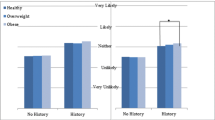Abstract
Purpose
To assess whether women with endometrial cancer could accurately classify their weight and identify the association between obesity and risk of endometrial, breast, and colon cancers.
Methods
This was an IRB-approved (Project No. 14-0075), survey-based cross-sectional study of women ages 18–80 years with a diagnosis of endometrial cancer. Patients were at least 6 months from hysterectomy and 3 months from chemotherapy or radiation. Statistical analysis was completed using Fisher’s exact test, T test, ANOVA, Wilcoxon rank-sum test, or Kruskal–Wallis test. P values were two-tailed with P < 0.05 considered statistically significant.
Results
140 women met inclusion criteria, and 133 questionnaires (95.0%) were completed. Mean age was 63.2 years (range 35–80), and mean BMI was 33.4 kg/m2 (range 17.6–72.2). Patients were primarily Caucasian (88.7%) and reported education beyond high school (67.8%). Among women with BMI 30.0–34.99 kg/m2, 12.9% perceived themselves as obese, compared to 32.0% of women with BMI 35.0–39.99 kg/m2, and 72.7% of women with BMI >40.0 kg/m2. Ability to correctly classify weight correlated significantly with education level (P = 0.02). Less than half of women identified obesity as a risk factor for breast (49.6%), colon (48.1%), and endometrial cancer (44.4%). 77% of all patients had discussed weight with their primary care doctor, and 38% had discussed weight with their oncologist (P < 0.001).
Conclusions
The majority of obese women with endometrial cancer surveyed were unable to accurately classify their weight. Given the inconsistency between patient weight and perception of cancer risk, this represents an opportunity for gynecologic oncologists to educate their patients about weight control.
Similar content being viewed by others
References
Ogden CL, Carroll MD, Kit BK et al (2014) Prevalence of childhood and adult obesity in the US, 2011–2012. JAMA 311(8):806–814
Calle EE, Rodriguez C, Walker-Thurmond K et al (2003) Overweight, obesity, and mortality from cancer in a prospectively studied cohort of US adults. N Engl J Med 348:1625–1638
Crosbie EJ, Zwahlen M, Kitchener HC (2010) Body mass index, hormone replacement therapy, and endometrial cancer risk: a meta-analysis. Cancer Epidemiol Biomark Prev 19:3119–3130
Jenabi E, Poorolaial J (2015) The effect of body mass index on endometrial cancer: a meta-analysis. Public Health 129(7):872–880
MacKintosh ML, Crosbie EJ (2013) Obesity-driven endometrial cancer: is weight loss the answer? BJOG 120:791–794
Renehan A, Tyson M, Egger M et al (2008) Body mass index and incidence of cancer: a systematic review and meta-analysis of prospective observational studies. Lancet 371:569–578
Siegel R, Ma J, Zou Z et al (2014) Cancer statistics, 2014. Ca Cancer J Clin 64:9–29
Koutoukidis DA, Knobf MT, Lancely A (2015) Obesity, diet, physical activity, and health-related quality of life in endometrial cancer survivors. Nutr Rev 73(6):399–408
Smits A, Lopes A, Das N et al (2014) The impact of BMI on quality of life in obese endometrial cancer survivors: does size matter? Gynecol Oncol 132(1):137–141
Arem H, Irqwin ML (2013) Obesity and endometrial cancer survival: a systematic review. Int J Obes (Lond) 37(5):634–639
Gunderson CC, Java J, Moore KN et al (2014) The impact of obesity on surgical staging, complications, and survival with uterine cancer: a Gynecologic Oncology Group LAP2 ancillary data study. Gynecol Oncol 133(1):23–27
Ward KK, Shah NR, Saenz CC et al (2012) Cardiovascular disease is the leading cause of death among endometrial cancer patients. Gynecol Oncol 126(2):176–179
Secord, Hasselblad V AA, Von Gruenigen VE et al (2016) Body mass index and mortality in endometrial cancer: a systematic review and meta-analysis. Gynecol Oncol 140:184–190
Soliman PT, Bassett RL, Wilson EB et al (2008) Limited public knowledge of obesity and endometrial cancer risk. Obstet Gynecol 112(4):835–842
Behavioral Risk factor surveillance system. Center for Disease Control. http://www.cdc.gov/brfss/questionnaires.
Lake Snell Perry and Associates (2003) Obesity as a public health issue: a look at solutions, results from a national poll
World Health Organization, BMI Classification. http://apps.who.int/bmi/index
Henretta MS, Copeland AR, Kelley SL et al (2014) Perceptions of obesity and cancer risk in female bariatric surgery candidates: highlighting the need for physician action for unsuspectingly obese and high risk patients. Gynecol Oncol 133(3):73–77
Acknowledgements
Approval was obtained from the Women and Infants Hospital Institutional Review Board (Project No. 14-0075) prior to data collection.
Author information
Authors and Affiliations
Corresponding author
Ethics declarations
Conflict of interest
The authors (EV Connor, CA Raker, MA Clark, and AR Stuckey) declare that they have no conflicts of interest to disclose.
All procedures performed in this study, which involved human participants, were in accordance with the ethical standards of our institution, were approved by our Institutional Review Board, and are in compliance with the 1964 Helsinki declaration and its later amendments or comparable ethical standards.
A statement of informed consent was included at the top of the survey instrument explaining that participation was voluntary, that responses would be maintained as anonymous, and that survey responses would not impact their clinical care.
Rights and permissions
About this article
Cite this article
Connor, E.V., Raker, C.A., Clark, M.A. et al. Obesity risk awareness in women with endometrial cancer. Arch Gynecol Obstet 295, 965–969 (2017). https://doi.org/10.1007/s00404-017-4301-4
Received:
Accepted:
Published:
Issue Date:
DOI: https://doi.org/10.1007/s00404-017-4301-4




